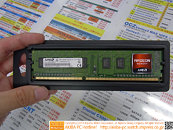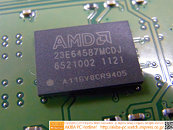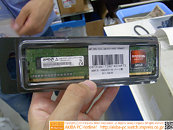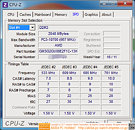- Joined
- Oct 9, 2007
- Messages
- 47,638 (7.44/day)
- Location
- Dublin, Ireland
| System Name | RBMK-1000 |
|---|---|
| Processor | AMD Ryzen 7 5700G |
| Motherboard | Gigabyte B550 AORUS Elite V2 |
| Cooling | DeepCool Gammax L240 V2 |
| Memory | 2x 16GB DDR4-3200 |
| Video Card(s) | Galax RTX 4070 Ti EX |
| Storage | Samsung 990 1TB |
| Display(s) | BenQ 1440p 60 Hz 27-inch |
| Case | Corsair Carbide 100R |
| Audio Device(s) | ASUS SupremeFX S1220A |
| Power Supply | Cooler Master MWE Gold 650W |
| Mouse | ASUS ROG Strix Impact |
| Keyboard | Gamdias Hermes E2 |
| Software | Windows 11 Pro |
At first glance, one would have discarded the news as some company's attempt to use the AMD brand to sell memory modules, but it is indeed AMD selling memory. AMD is selling Radeon-branded DDR3 memory modules to the consumer market, not just OEMs, which were spotted in stores in Japan. AMD is selling certified DDR3 memory in three segments: Entertainment, UltraPro Gaming, and Enterprise. Entertainment deals with DDR3-1333 MHz modules that are best suited for home and business client PCs, UltraPro Gaming deals with DDR3-1600 MHz modules suited for gaming PCs of all shapes and sizes, while Enterprise deals with registered un-buffered DDR3 memory for use in AMD Opteron-driven servers and workstations.
While baffling, the move to sell its own-branded memory makes some sense. High performance DDR3 memory kits sold in the market today that operate at DDR3-1600 rely on Intel eXtreme Memory Profiles (XMP), a proprietary SPD extension by Intel to let users set the marketed speeds easily. AMD platform motherboards don't support XMP, leaving it at an obvious disadvantage. Radeon-branded memory use JEDEC profiles for 1600 MHz, along with certified timings and voltages to run stable and perform optimally. It might also be using AMD's own SPD extension called "Black Edition profiles", but CPU-Z doesn't seem to be able to spot that. Pictured below is the Entertainment 2 GB module, which uses AMD-branded memory chips. In Japan, the 2 GB module is priced at the equivalent of US $20. Other pricing information is unknown for the moment.




UPDATE (11/8): We contacted AMD to talk a little bit about these new memory products that surfaced literally out of nowhere. AMD told us that these are channel products, and as such they don't plan to sell it in a big way on the retail market:
View at TechPowerUp Main Site
While baffling, the move to sell its own-branded memory makes some sense. High performance DDR3 memory kits sold in the market today that operate at DDR3-1600 rely on Intel eXtreme Memory Profiles (XMP), a proprietary SPD extension by Intel to let users set the marketed speeds easily. AMD platform motherboards don't support XMP, leaving it at an obvious disadvantage. Radeon-branded memory use JEDEC profiles for 1600 MHz, along with certified timings and voltages to run stable and perform optimally. It might also be using AMD's own SPD extension called "Black Edition profiles", but CPU-Z doesn't seem to be able to spot that. Pictured below is the Entertainment 2 GB module, which uses AMD-branded memory chips. In Japan, the 2 GB module is priced at the equivalent of US $20. Other pricing information is unknown for the moment.




UPDATE (11/8): We contacted AMD to talk a little bit about these new memory products that surfaced literally out of nowhere. AMD told us that these are channel products, and as such they don't plan to sell it in a big way on the retail market:
AMD does not manufacture memory and does not plan to sell system memory directly to our customers. AMD is currently determining if the sale of AMD Radeon-branded memory through channel partners is a viable opportunity and as such it has appeared in some regions for purchase through retail.
View at TechPowerUp Main Site
Last edited:







